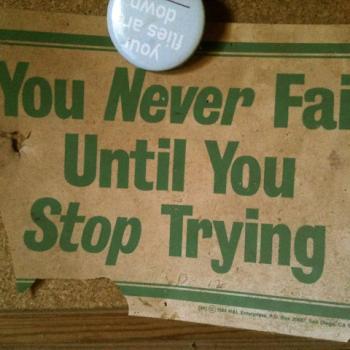AKA The Universe is Flat
When I was young, my perception was Valentines Day was a man-made holiday for children. When I got married, guess who abruptly, nearly catastrophically changed my mind. I learn just slightly faster than an earthworm. Ergo, my article: What Not to Give Your Wife on a Romantic Holiday.
Perception is as perception does. For example, consider the national shortage of spoons. I’ve noticed for decades that concealed by their napkin wrapper, spoons are often missing from the sets of tableware restaurants put on the table.
Perhaps it’s an international shortage. Even mentioning an international scope creates a perception that it’s an international reality. Why is there an international shortage of spoons? Maybe there is!
In a previous article, I stated that it’s a matter of focus. We create idols out of particular sins by focusing too much on them. If we focus on each time we notice spoons are absent in our tableware, we think it’s a problem.
I’ve written comedy about this problem. “It’s an international shortage!” we scream to all who will hear. Uh, huh. But if we focus on all the times the spoons are there, we have a very different perception. Spoons are infrequently a problem.

“So we’re not giving up. How could we! Even though on the outside it often looks like things are falling apart on us, on the inside, where God is making new life, not a day goes by without his unfolding grace. These hard times are small potatoes compared to the coming good times, the lavish celebration prepared for us. There’s far more here than meets the eye. The things we see now are here today, gone tomorrow. But the things we can’t see now will last forever.” 2 Corinthians 4:18 (The Message Bible)
Convergence.org recently had an article, Encouraging Conversations Might Save Us. It’s very true.
We’re ready to believe the ugly and we receive it abundantly
“|” Is it a carrot or a stick, an I or an L? What do you want it to be?
Examples of what we are fed are distortion in the news media and congressional approval ratings. If we say there’s a 40% disapproval rating, it sounds bad. But that means 60% either approve or have no opinion. Sixty percent approval is very good. Congress has an approval rating in the teens. Is congress the problem, or the divided people they represent?
If we focus on horrible international events, the grandstanders who declare, “The end is near,” make a convincing case. Yet the world has much less conflict than in previous history. Most countries no longer invade other countries for their land and resources.
This picture becomes clear when we consider that the world completely rejected Sadam Hussein’s attempt to annex Kuwait. Russia is now the one exception of invading other countries with their war against Ukraine. And about hostility within countries, the current terrorist groups are a continuation of past revolutionaries fueled mostly by financial inequality. When inequality doesn’t have footing, neither does terrorist support.
“Wars and rumors of wars,” yes, but we’re much more secure than ever before in history. We’re better able to resolve problems. But news headlines focus on outrage and the sensational to get our attention so they attract viewers. It’s an unhealthy system driven by advertising money. Outrage and sensationalism sell ads. Watch PBS … okay I actually stream all news media on Haystack. Lots of different perspectives on Haystack.
What our minds dwell on is what we become
When we focus on outrage, we not only think the world is going to hell in a handbasket, we devote our time and energy to thinking about that problem. We are what we think. If our time and attention are on that, this is what we become, which is nothing more than the antithesis of the perceived problem.
God is love. If we focus on this, we become love.
I said, “perceived problem.” Perception doesn’t necessarily mean a problem doesn’t exist. But our perception of why it exists and how deep the problem is can be driven by those in the driver’s seat who gain from our misunderstandings. It could be a politician, guru, influencer, activist, or business leader seeking to control our perceptions. They work extremely hard at manipulating us.
How to avoid being fooled by master manipulators
In my ten-part series, Fighting Propaganda: Don’t let yourself be fooled by propaganda, I explain the many ways others manipulate us. You can use this link to start discussions and help get rid of the negativity and radical agendas that are dividing us.
Conspiracy theories are plentiful in this rich soil of outrage, suspicion, and manipulation
Maybe what I’m writing here is just a conspiracy with a questionable agenda. I began thinking about conspiracies when I noticed the international spoon shortage. Here are some conspiracy theories related to spoon shortages:
- College students steal them, along with salt shakers, for their dorm rooms. This theory presupposes that college students don’t need knives and forks. Maybe they file spoons into sporks?
- People dangle spoons from their sticky nose as table tricks, and then forget they are on their nose and walk out with them. I’ve been watching the exits for evidence.
- Computer programmers and writers, who often eat at their computers, desperately need spoons. They could starve! They absentmindedly leave with them, their minds permanently transfixed by computer code or prose scrolling before their eyes. I’ve been monitoring myself since I write both.*
- It’s a psychic spoon bending demonstration going out of control.
- Eating utensil manufacturers want restaurants to purchase more utensils so their sales people sneak spoons out during sales visits. Watch for “We sell in sets only,” as evidence.
Soon I had more theories than spoons.
“Clean up your plate!” is permanently inscribed on the inside eyelids of most of us. Having heard that people are starving in far off Uagabanda, people are cleaning their plates by sending take-home boxes to them, spoons and all.
The food health fanatics want us to quit drinking coffee. Studies show that after four cups you are in danger, so they go around stealing spoons thinking that they are doing us a favor.
Too many people linger over their deserts, so by eliminating spoons, customers leave the restaurant more quickly, leaving room for more customers.
Sloppy kids spread pancake syrup from door to door in pancake houses, resulting in them walking out with spoons stuck to their clothes.
Efficiency experts are running the store: self-explanatory.
I can prove none of these theories, but I know the spoon shortage is a true conspiracy because my perception is that there is a conspiracy. I know what I know.
I, too, am sometimes fooled by perceptions. I used the phrase “niche market” for years. I was blithely pronouncing it “nich,” undoubtedly having learned the pronunciation by osmosis from the fools with whom I associate. But then I happened upon some enlightened person who pronounced it “neesh.” Soooo, I perceived, this word must be of foreign origin and I have been erroneously pronouncing it. Over the next few days, I intelligently pronounced it “neesh,” to as many people as would listen. But as the days progressed, I had this nagging feeling that something wasn’t quite right. So I looked up the word in the dictionary:
“Nich,” it spoke. Aargh! Poisoned again.
You know what? Spread this perception: The universe is flat.
Oh, wait. Images of both spiral galaxies and the universe show that it actually is flat. Oh, well. Think of something else and spread the poison.
Can’t think of a tantalizingly wicked conspiracy to go viral? Think about the good things to insulate yourself from all this negativity, and spread love. Love goes viral.
- Dorian
Our answer is God. God’s answer is us. Together we make the world better.
* Last week I developed my Connexions.life website for resources for age 15 to 35. Not yet ready to launch.
Note: I published portions of this post about perceptions on my Visual Writer website.














